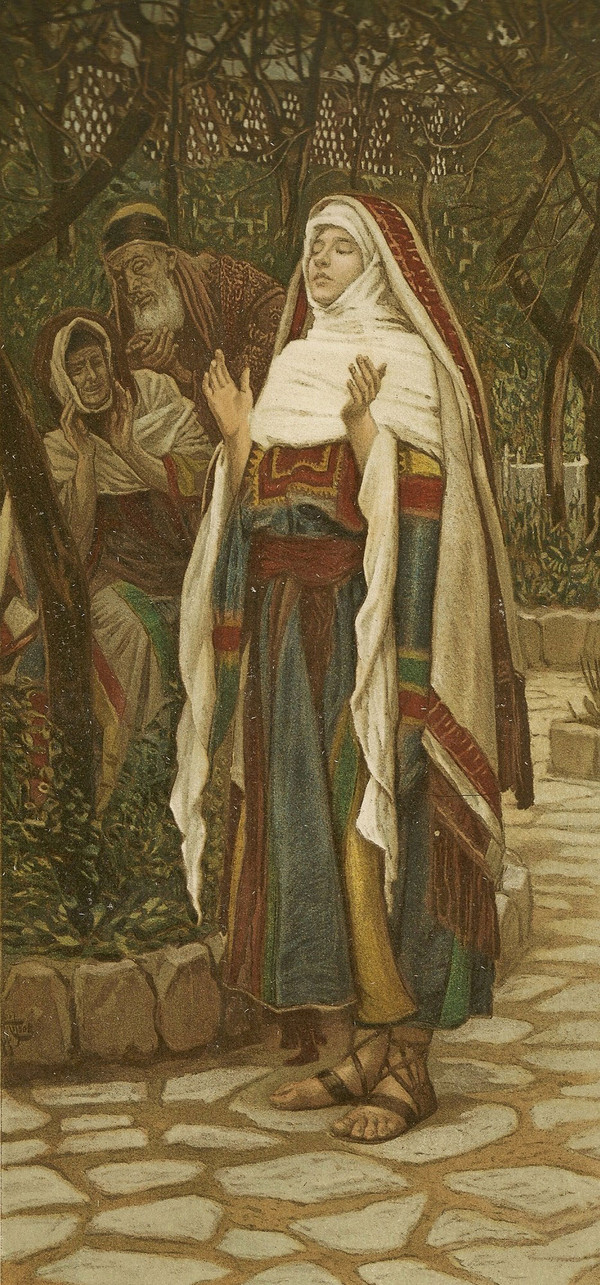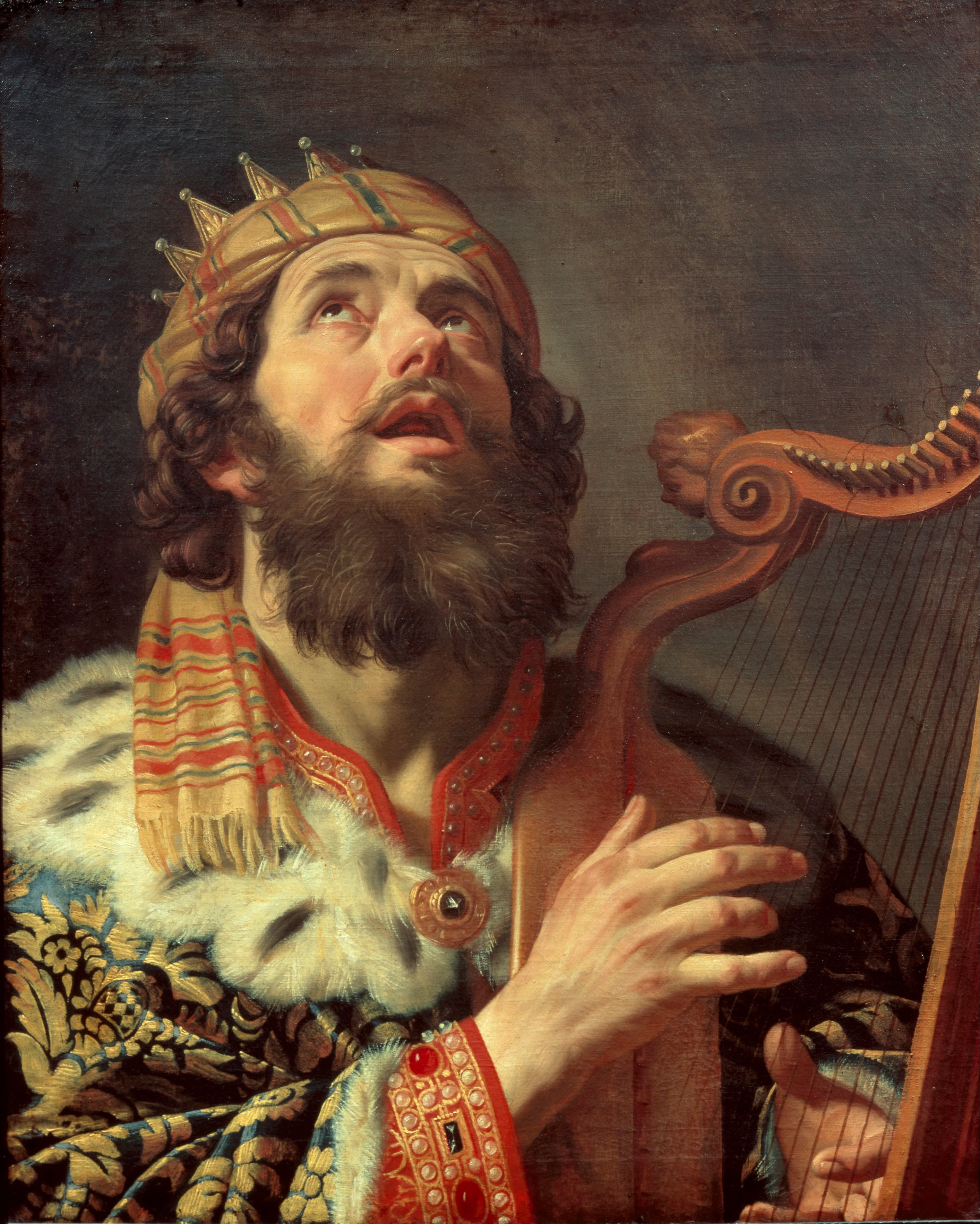
Mary’s Magnificat
“(Le magnificat)”
“James Tissot – Brooklyn Museum”
In this regular feature I focus on the psalm-reading for the upcoming Sunday, and try to post that meditation-on-a-psalm by the Wednesday leading up to that upcoming Sunday. I also meditate on and highlight the psalms in the Daily Office Readings (DORs) for the week leading up to that Wednesday posting. (Confused about “DORs?” See What’s a DOR?)
That means this week the highlighted DOR psalms will be chosen from the The Lectionary – Satucket readings from Wednesday December 10 through Tuesday December 16. (And at this point there may be some readers asking, “What, the psalms again? Why pay so much attention to the Psalms?” For the simple answer to this question, see On the psalms.)
The Lectionary has two choices for Sunday December 21, either Canticle 15 (the Song of Mary also known as The Magnificat) or Psalm 89:1-4, 19-26, discussed further below. The DOR psalms are from the readings for Wednesday December 10 up to Tuesday December 16.
Here are some highlights from those past-week Daily Office readings.
From Thursday December 11, Psalm 37:14 and 17: “The Lord laughs at the wicked, because He sees that their day will come,” and “The little that the righteous has is better than great riches of the wicked.” On the note of God having a sense of humor (He “laughs at the wicked”), see On the readings for Pentecost (6/8/14), citing Psalm 104:27: “There move the ships, and there is that Leviathan, which [God] made for the sport of it.”
From Friday December 12, Psalm 31:5: “Into your hands I commend my spirit, for you have redeemed me, O Lord, O God of truth.” Jesus quoted that verse on the cross, at Luke 23:46: “Jesus called out with a loud voice, ‘Father, into your hands I commit my spirit.’ When he had said this, he breathed his last.” (See also Acts 7:59.)
The readings for Sunday December 14, included Psalm 63, known to some as “Patton’s psalm,” a psalm at once both “humble and defiant.” See On Patton, Sunday School teacher. They also included Psalm 98:1, “Sing to the Lord a new song, for He has done marvelous things.” On that note see On the DORs for July 20, which asked the musical question:
How can we do greater works than Jesus if we interpret the Bible in a cramped, narrow, strict and/or limiting manner? For that matter, why does the Bible so often tell us to “sing to the Lord a new song?” (For example, Isaiah 42:10 and Psalms 96:1, 98:1, and 144:9.)
Or use the Search-box above right and just type in “sing Lord new song.”
And finally, the DORs for Monday December 15 included Psalm 41:1: “Happy are they who consider the poor and needy! The Lord will deliver them in time of trouble.” Note also the GOD’S WORD® Translation, which reads, “Blessed is the one who has concern for helpless people. The LORD will rescue him in times of trouble.”
Either way, that sentiment is particularly appropriate at this time of year.
As to the psalms for December 21, the first Lectionary choice is Canticle 15, also known as the Song of Mary or the Magnificat, which begins, “My soul doth magnify the Lord…”
As noted in Magnificat – Wikipedia, the text of the canticle is from the Luke 1:46-55, “where it is spoken by the Virgin Mary upon the occasion of her Visitation to her cousin Elizabeth.” When Mary greeted Elizabeth – “pregnant with the future John the Baptist” – the child (John) moved within Elizabeth’s womb, and when “Elizabeth praises Mary for her faith, Mary sings what is now known as the Magnificat in response:”
Mary’s Magnificat, celebrated only in Luke’s Gospel, [is] distilled from a collection of early Jewish-Christian canticles [and] patterned on the “hymns of praise” in Israel’s Psalter… Mary symbolizes both ancient Israel and the Lucan faith-community as the author/singer of the Magnificat… The canticle echoes several Old Testament biblical passages [including] the Song of Hannah, from the Books of Samuel (1Samuel 2:1-10). Scriptural echoes from the Torah, the Prophets and the Writings complement the main allusions to Hannah’s “magnificat of rejoicing” in l Samuel 2:1-10.
The alternate choice is Psalm 89:1-4, 19-26, which begins in a similar vein: “Your love, O LORD, for ever will I sing; from age to age my mouth will proclaim your faithfulness.”
Psalms 89 – Matthew Henry Commentary summarized Psalm 89 like this:
Many psalms that begin with complaint and prayer end with joy and praise, but this [psalm] begins with joy and praise and ends with sad complaints and petitions… It is uncertain when it was penned; only, in general, that it was at a time when the house of David was woefully eclipsed; some think it was at the time of the captivity of Babylon, when king Zedekiah was insulted over, and abused, by Nebuchadnezzar… (E.A.)
And the International Bible Commentary (IBC) said this psalm illustrates faith’s perplexity: “Nowhere is the paradox of faith and sight, divine promise and human experience, more pronounced.” Further on the IBC said the psalm as a whole alternated the “glorious revelation” of God with the “ugly reality” of everyday life.
But the verses in today’s psalm focus on the positive. Verses 3-4 read: “I have made a covenant with my chosen one; I have sworn an oath to David my servant: ‘I will establish your line for ever, and preserve your throne for all generations.'” And verses 25-26 close on a positive note for the line of King David (seen below): “I shall make his dominion extend from the Great Sea to the River. He will say to me, ‘You are my Father, my God, and the rock of my salvation.'”

The upper image is courtesy of Magnificat – Wikipedia, the free encyclopedia.
Re: “Happy are they who consider the poor and needy!” See also Deuteronomy 15:10, Ruth 2:19, Psalm 82:3, Psalm 82:4, Proverbs 14:21, Proverbs 29:7, and Daniel 4:27.
Re: canticle. A”hymn, psalm or other song of praise taken from biblical texts other than the Psalms,” derived from the “Latin canticulum, a diminutive of canticum, ‘song.'” See Canticle – Wikipedia.
The lower image was prompted by the web article King David misunderstood says Yale scholar, with the rest of the headline reading: “Politician, psalmist, adulterer and more.” The Old Testament scholar in question is Doctor Joel Baden, whose work – including his The Historical David: The Real Life of an Invented Hero – “ruined King David” according to some Yale divinity students.
Baden said as a result of his research he “found someone more animated than the glorified felt-board action hero many have come to know.” He added that even though David was an authentically-important historical figure who literally changed the course of history, that glorification came at a price: We’ve since lost sight of David as a real-life “living breathing human being” with all our inherent faults and flaws. Baden went on to say of his methods:
The starting point is the biblical text itself. I try to understand not only what the biblical authors were saying, but why they were saying it. That is to say, what was their purpose in writing these stories the way that they did? I take very seriously what they actually wrote: what they included (and didn’t include)… The second important step is to view David not as a character in the Bible, but as a living, breathing man in the early first millennium BCE… The portrayal of David I put forward in the book is thus a combination of these two approaches: a close reading of the biblical text filled out with the background of the ancient world as we now understand it. It is an attempt to find the real David moving beneath the veneer of the Bible’s own interpretation of his life. (E.A.)
Which is pretty much what I’m trying to do in and with this blog, under the theory that the Bible was not written by super-heroes who aren’t remotely like us, but rather that it was written by people just like us – “with all our inherent faults and flaws” – but we digress…
The starting point is the biblical text itself. I try to understand not only what the biblical authors were saying, but why they were saying it. That is to say, what was their purpose in writing these stories the way that they did? I take very seriously what they actually wrote: what they included (and didn’t include), what they must have known of David’s life (and what they could not have known). The life of David as we have it in the books of Samuel and Kings is not presented as a mere rehearsal of historical facts. There is a consistent portrayal of David, and those around him, that leads to a very specific interpretation of his life.
Throughout, the elements that support this interpretation are those that, from a purely historical perspective, are most unverifiable: private moments and dialogues, secret divine pronouncements, and the like. In other words, the tools of an author writing a story intended to convince his readers. And convincing they have certainly been. But for just that reason, I want to try to understand the arc of David’s life without the interpretive overlay provided by the biblical authors. Which is not to say that everything they suggest is necessarily false, by any means. But it is not necessarily the most likely explanation either.
The second important step is to view David not as a character in the Bible, but as a living, breathing man in the early first millennium BCE. Archaeological and historical work has gone a long way toward filling in the gaps in our knowledge of this period, though there is always more to be done. But we are no longer at the mercy of the Bible in trying to reconstruct the world that David inhabited. We know plenty about ancient Israel and its neighboring cultures – especially their politics, economy, and religion – and this knowledge allows us to make at least some reasonable guesses as to what sort of life David would have lived.
The portrayal of David I put forward in the book is thus a combination of these two approaches: a close reading of the biblical text filled out with the background of the ancient world as we now understand it. It is an attempt to find the real David moving beneath the veneer of the Bible’s own interpretation of his life.
– See more at: http://jonathanmerritt.religionnews.com/2013/10/31/king-david-misunderstood-baden/#sthash.INaBDzx7.dpuf
I.e., the lower image itself is courtesy of File: Gerard van Honthorst – King David Playing the Harp. The artist (1590-1656) was a “Dutch Golden Age painter” who early in life visited Rome, where he found success “painting in a style influenced by Caravaggio. Following his return to the Netherlands he became a leading portrait painter.” See Gerard van Honthorst – Wikipedia.